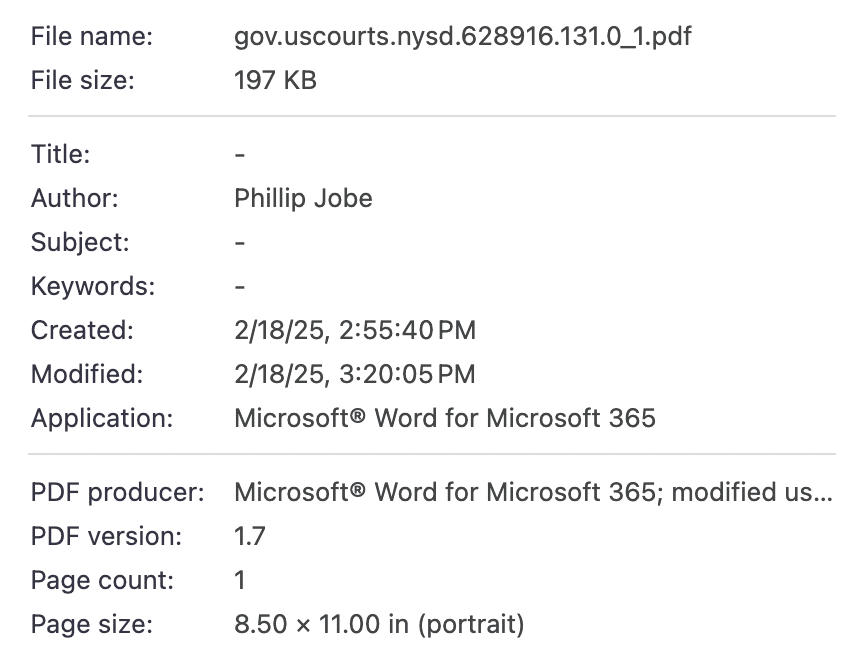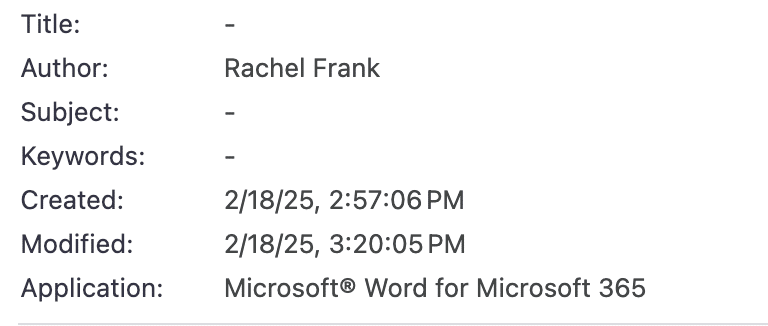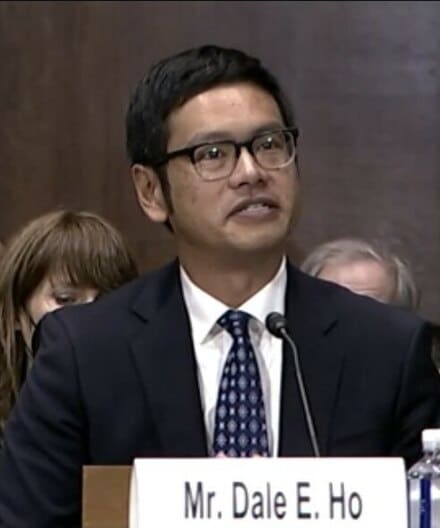Imagine you’re Judge Dale Ho.
You’re presiding over the Eric Adams case, that of his co-conspirator Erden Arkan, and have gotten notice of another co-conspirator, Mohamed Bahi, as a related case (meaning that Bahi is likely supposed to plead guilty before you in coming days — what was intended as a last step before superseding Adams with obstruction).
The Adams case has blown up very publicly. The prosecution team has been withdrawn from the case. But even before that, the Acting Deputy Attorney General has requested you dismiss the case, without prejudice. You know Bove’s pulling a fast one. But technically, the only things before you are the Nolle Prosequi request and the withdrawal motion.
What do you do? Even beyond the question of whether you grant the request to dismiss without prejudice (Bove’s ask), you dismiss with prejudice (perhaps the easiest and most legally justifiable thing to do), or you muck things up, what do you do to get there?
Four documents pertaining to this blow up (in addition to the ones filed before Judge Ho) were released publicly last week. Here’s the purpose they ostensibly serve:
- February 10: Emil Bove tells Danielle Sassoon to dismiss the case, without prejudice
- February 12: Danielle Sassoon asks Pam Bondi to meet
- February 13: Bove responds to Sassoon, accepting her resignation
- February 13: Hagan Scotten resigns
But the documents do more. All four of them weigh in on two key paragraphs that made it into the Nolle Prosequi letter: the two stated reasons for dismissing the case against Adams, which look like this in the dismissal request:
5. In connection with that determination and directive, the Acting Deputy Attorney General concluded that dismissal is necessary because of appearances of impropriety and risks of interference with the 2025 elections in New York City, which implicate Executive Order 14147, 90 Fed. Reg. 8235. The Acting Deputy Attorney General reached that conclusion based on, among other things, review of a website2 maintained by a former U.S. Attorney for the Southern District of New York and an op-ed published by that former U.S. Attorney.3
6. In connection with that determination and directive, the Acting Deputy Attorney General also concluded that continuing these proceedings would interfere with the defendant’s ability to govern in New York City, which poses unacceptable threats to public safety, national security, and related federal immigration initiatives and policies. See, e.g., Executive Order 14159, 90 Fed. Reg. 8443; Executive Order 14165, 90 Fed. Reg. 8467. The Acting Deputy Attorney General reached that conclusion after learning, among other things, that as a result of these proceedings, Adams has been denied access to sensitive information that the Acting Deputy Attorney General believes is necessary for Adams to govern and to help protect the City.
Public comments from Damian Williams that barely mention Adams create an appearance of impropriety, Bove claims, and the prosecution would interfere with Adams’ ability to govern New York, which Bove suggests (by citation to two of Trump’s immigration crackdown Executive Orders) consists primarily in chasing migrants.
Again, the other letters are not formally before Ho (yet). But Ho has presumably read Hagan Scotten’s take on these two excuses, which labels the first as a pretext and the second as coercion.
In short, the first justification for the motion—that Damian Williams’s role in the case somehow tainted a valid indictment supported by ample evidence, and pursued under four different U.S. attorneys is so weak as to be transparently pretextual. The second justification is worse. No system of ordered liberty can allow the Government to use the carrot of dismissing charges, or the stick of threatening to bring them again, to induce an elected official to support its policy objectives.
Mind you, Bove has invented something in his immigration excuse — that “Adams has been denied access to sensitive information that the Acting Deputy Attorney General believes is necessary.” He actually ordered Sassoon to, “take all steps within your power to cause Mayor Adams’ security clearances to be restored,” in his first letter (which, again, is not formally before Ho). He complained, again, that “Mayor Adams has been denied a security clearance that limits his access to details of national security issues in the City he was elected to govern and protect” in his response.
It’s transparent bullshit. While it may be the case that the Biden Administration had limited sharing of classified information with Adams after his indictment for allegedly taking undeclared gifts from a foreign government [!!!], that’s entirely the prerogative of the President, as Trump has made clear with his hasty grant of security clearance to people manifestly unsuited and his festival of security clearance removals since, first 51 spooks, then Joe Biden himself, and then Tish James and Alvin Bragg, among others. Pretty nutty that Bove says that Eric Adams can’t be prosecuted because it means he can’t see sensitive information when Trump has arbitrarily withheld that very same sensitive information from New York’s Attorney General and the District Attorney, huh?
It’s another pretext.
Ho can easily dismiss Bove’s first rationale — the appearance of impropriety — because (as Sassoon noted) he already did, in a ruling on one of Adams (and Elon Musk) attorney Alex Spiro’s serial claims that the government was leaking grand jury information.
One additional filing bears mention. On January 18, 2025, Mayor Adams submitted a letter accusing the former U.S. Attorney for the Southern District of New York of violating Local Criminal Rule 23.1 through statements made in an op-ed published on January 16 and on his “new website.” See Letter, Jan. 18, 2025, ECF No. 99 (“Jan. 18 Letter”). The Mayor states that this evidence “should be considered by the Court when ruling on Mayor Adams’s Renewed Motion for an Evidentiary Hearing and for Sanctions Including Dismissal.” Id. at 3. Having reviewed the submission and the evidence referenced within it, the Court concludes that it does not change the Court’s analysis. Neither Mr. Williams’s op-ed itself nor the media it incorporates by reference so much as allude to the grand jury proceedings that led to Mayor Adams’s indictment, let alone disclose protected information from those proceedings. Rule 6(e) is not implicated by the materials, and they do not substantiate Mayor Adams’s claim that the Government has disclosed grand jury information in violation of the Rule.5
5 Although Mayor Adams does not request relief under Local Rule 23.1, the Court notes that, after carefully reviewing Mr. Williams’s op-ed, the op-ed does not contain any statements that run afoul of the Rule’s prohibitions. In the op-ed, Mr. Williams provides hyperlinks to several prosecutions brought during his tenure as U.S. Attorney, including those of federal and state elected officials, but none concern Mayor Adams. In fact, the majority of the statements in the oped that Mayor Adams claims are problematic concern New York State rather than New York City politics. For example, Mayor Adams highlights Mr. Williams’s statements that “[t]he ability to raise obscene sums of money for a campaign is precisely the wrong bottleneck to elected office,” and that “[i]t reeks of pay-to-play corruption and is offensive to most New Yorkers . . . ” Jan. 18 Letter at 2 (quoting Williams’s op-ed). But those sentences are found in a paragraph lamenting the ability of candidates “to raise money from individuals or entities with business before the state,” opining that “[t]he state’s new matching funds program is woefully inadequate,” and arguing in favor of “a truly transformative public financing system for state elections. . . ” Id. (emphases added). They do not appear to be directed at New York City politics generally or at this case specifically.
There is one sentence in the op-ed stating that “[t]he public reporting alone paints a picture” that “America’s most vital city is being led with a broken ethical compass,” id. at 1, which could plausibly be read to be a reference to Mayor Adams (among others). This particular statement, however, “do[es] not cross the line drawn by [Local] Rule 23.1 in the sense that [it] do[es] not, by [itself], constitute opinions as to the Defendant[’s] guilt, and [is] not otherwise the type of statement[] proscribed by the rule.” United States v. Smith, 985 F. Supp. 2d 506, 539 (S.D.N.Y. 2013) (citing Local Rule 23.1(d)). Nor does the statement “go[] beyond the public record.” Local Rule 23.1(b). Of course, “[i]t is essential that prosecutors respect both the power of their words and their office, and ensure that their public comments are carefully tailored solely to further valid law enforcement interests and to steer far clear of violating a defendant’s fundamental right to a fair trial.” Id. at 541. Here, the Court finds that Mr. Williams has not violated those duties.
The arrogance! Bove is telling a judge he has to dismiss an indictment, in part, because Bove asserts as true something that Ho has already said is not true!
But Ho will have to, without more, treat Bove’s second excuse — Adams’ need to do his job to keep NYC safe from migrants — with a presumption of regularity.
Unless and until those other letters alleging this is a quid pro quo come before him.
Sassoon’s letter, which I assume Ho has read, did more than rebut Bove’s thin pretexts. It:
- Laid out citations that Bove did not, including:
- Reviewed of all the approvals at DOJ for the prosecution, including the timing.
- Described that Bove seized the notes that one of her team members took in a January 31 meeting, at which Spiro pitched this plan.
She also invoked Judge Ho, twice by function — citing Judge Ho’s treatment of Spiro’s serial claims of leaks and his specific focus on Williams’ actions (linked above) and reviewing how he had granted Adams’ own request with regards to trial timing. Then she invoked Judge Ho by name, predicting that he would do a “searching inquiry” on this case.
The assigned District Judge, the Honorable Dale E. Ho, appears likely to conduct a searching inquiry in this case. Notably, Judge Ho stressed transparency during this case, specifically explaining his strict requirements for non-public filings at the initial conference. (See Dkt. 31 at 48-49). And a rigorous inquiry here would be consistent with precedent and practice in this and other districts.
In support, she cited this admonition from Ho, in response to seeming attempts to communicate directly with chambers last fall and in the process hide public court hearings.
I want to be clear that in the future, if there are requests to change a certain date, or to have a certain date, I should say, you’ll stick to what you request. If you need a change, you’ll file it on ECF, not via email to chambers. I’ll only consider it if you explain why there’s good cause in a single submission for a change in the date. If you don’t, I’ll deny it on that basis alone. I just want to make sure that counsel understands that and see if there are any questions from counsel as to those instructions.
[snip]
THE COURT: One other guideline that I want to hit, which is with respect to the presumption of public access to documents. Now I understand there may be CIPA issues involved in this case and we’ll take those as they come, but I just want to remind counsel that there’s a presumption of public access to judicial documents, and this is obviously a case of significant public interest. Other than what you can, without court approval, file in redacted or sealed form under the local rules, things like personal identifying information, financial account numbers and the like, I expect requests for redaction of documents to be narrowly tapered.
And just to go over the rules here for the procedures, I should say, if it’s necessary to file a sealed or redacted document, you have to file a letter motion seeking to redact or seal that document specifying the reasons for such sealing or redaction and citing authority that those reasons can justify overcoming the presumption of public access and then file their own redacted documents under seal, which will remain temporarily sealed until the Court resolves the motion to redact or seal the documents, and if it’s appropriate, file a redacted version of those documents on the public docket.
So Sassoon cited “the Court” several times to lay out aspects of the record that Bove got wrong, and then she invoked Judge Ho by name, effectively saying, “Hey Judge Ho, remember that you have ordered both parties in this case to make all documents public? You might want to do that here.”
Now, there are obvious documents we’d all like to see that, if these other documents are formally aired in this case, I expect Judge Ho to request, starting with the notes someone from SDNY took at a January 31 hearing. Bove also described written submissions from prosecutors and Adams’ team in his response and a February 3 memo from SDNY that, he describes, denied a quid pro quo. He also claims Sassoon, “acknowledged previously in writing” that there was no quid pro quo, which may be that February 3 memo. And there are all the letters that are public but not formally before him.
Again, Judge Ho may demand all that if and when he begins to look closely.
But there’s another document that is missing, conspicuously so.
Bove’s Nolle Prossequi motion describes that Adams has consented to dismissal, but he does not include it.
Through counsel, Defendant Eric Adams has consented in writing to this motion and agreed that he is not a “prevailing party” for purposes of the Hyde Amendment. See P.L. 105- 119, § 617, 111 Stat. 2440, 2519; 18 U.S.C. § 3006A note.
This is, quite frankly, either insane or rank incompetence. There is no way any judge, former ACLU voting rights lead or not, would accept a dismissal without prejudice without seeing that documented. It may be that Adams will file notice of his consent on Monday (Mike Flynn filed his own notice of consent five days after Bill Barr filed to dismiss the indictment), but Bove had something in writing on Friday.
Mr. Bove specifies that Adams must consent in writing to dismissal without prejudice. To be sure, in the typical case, the defendant’s consent makes it significantly more likely for courts to grant motions to dismiss under Rule 48(a). See United States v. Welborn, 849 F.2d 980, 983 (5th Cir. 1988) (“If the motion is uncontested, the court should ordinarily presume that the prosecutor is acting in good faith and dismiss the indictment without prejudice.”). But Adams’s consent— which was negotiated without my office’s awareness or participation—would not guarantee a successful motion, given the basic flaws in the stated rationales for dismissal. See Nederlandsche Combinatie, 428 F. Supp. at 116-17 (declining to “rubber stamp” dismissal because although defendant did not appear to object, “the court is vested with the responsibility of protecting the interests of the public on whose behalf the criminal action is brought”). Seeking leave of court to dismiss a properly returned indictment based on Mr. Bove’s stated rationales is also likely to backfire by inviting skepticism and scrutiny from the court that will ultimately hinder the Department of Justice’s interests. In particular, the court is unlikely to acquiesce in using the criminal process to control the behavior of a political figure. [my emphasis]
And that may be one of the most important details in Sassoon’s letter to Bondi: Bove negotiated the key point of leverage, dismissal without prejudice with the stated expectation that DOJ will revisit things if and when Adams is reelected in November, without the involvement of SDNY.
When Sassoon invited Judge Ho, by name, to use his early admonition about public filings “to conduct a searching inquiry in this case,” she suggested that Bove was skirting that earlier admonition. Dale Ho likely didn’t need Sassoon’s invitation, and doesn’t need to first find a way to adopt this correspondence to the public docket.
Because Bove insanely submitted a request to dismiss the indictment without the most important piece of the paperwork.
Timeline and documents
January 31: Meeting at which someone from SDNY took notes, which were confiscated.
February 3: Date of SDNY memo that, per Bove, denies a quid pro quo.
Monday, February 10: Bove letter to Sassoon (addressed as Acting US Attorney), ordering her to dismiss the case.
Wednesday, February 12: Sassoon letter to Pam Bondi, asking to meet.
Thursday, February 13: Bove letter to Sassoon, firing her.
February 13 or 14: Hagan Scotten resignation letter.
Friday, February 14: Nolle Prosequi letter submitted by Acting Criminal Division Chief Antoinette Bacon and AUSA Edward Sullivan, signed by Bove.
Update: Added the February 3 memo.





